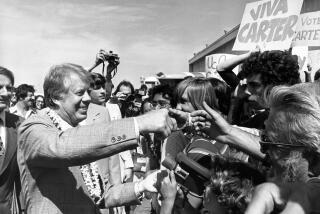Vietnam Draft Issue Soured Ambitious Pair’s Friendship : Candidate: Bill Clinton’s Oxford classmate kept notes and letters that would echo in a presidential election a quarter of a century later.
LITTLE ROCK, Ark. — It was the draft issue that soured the friendship of Cliff Jackson and Bill Clinton back in the fall of 1969--an episode of no public note at the time, but one that would echo through a presidential campaign nearly a quarter-century later.
Jackson, then a Republican activist, and the already politically ambitious Clinton had become classmates at Oxford University in the fall of 1968. They were teammates on the university’s “B” basketball team. And despite their partisan differences, they shared other important similarities: Both were Arkansas natives. Both were critical of the war in Vietnam. And both had escaped the draft during the previous summer.
Jackson failed his pre-induction physical examination--thanks, he thought, to a sympathetic doctor, while Clinton’s pre-induction processing was delayed by a sympathetic local draft board, details of which Jackson said they exchanged on one “cold and miserable” English winter night as they walked home from basketball practice.
When Clinton received his draft notice in the spring of 1969, Jackson became his ally in efforts to avoid induction. Those efforts began in England with meetings recorded in Jackson’s letters and on a calendar from Sullivan’s Drug Store of Malvern, Ark.
“I feel sorry for him in this predicament,” Jackson would write to a mutual friend. “It could easily have been me!”
Back in Arkansas, where Republicans at the time controlled the governor’s mansion and the state Selective Service office, Jackson said his GOP contacts were regarded as valuable lobbying assets by Clinton. The young Jackson began to wonder whether Clinton’s friendship was genuine, confiding to the same mutual friend: “But perhaps I’m too concerned with (his) sincerity, too sensitive to pretense and attempts at exploitation. . . . “
Later, feeling that he had played an instrumental role in helping Clinton get his draft notice canceled, Jackson was angered to learn that his friend was not going to keep a key element of the bargain. Clinton had received an ROTC deferment from the University of Arkansas, but was not planning to enroll in the law school.
“I remember Cliff fuming around the office,” recalled Van Rush, executive director of Arkansas Republican Party headquarters where Jackson worked as his research assistant. Jackson said he “felt disappointed and betrayed” by Clinton’s change of plan.
“We knew we were obtaining for him treatment that the average person could not receive,” Jackson said in a recent interview. “But I justified it in my own mind because I thought he was going to serve in the ROTC and because he was my friend.”
Clinton aides say Jackson’s recollection of his friendship with the candidate is exaggerated, that Clinton does not recall Jackson playing an important role in counseling him on the draft. Betsey Wright, a Clinton spokeswoman who said she has reviewed the candidate’s personal papers, said they were only “friendly acquaintances.”
From examining Clinton’s papers, she said, “it was clear that Cliff was not among his closest friends and advisers.”
Nevertheless, Jackson’s personal letters from that period contain numerous references to Clinton, including accounts of their discussions about politics, women friends and the draft.
Ultimately, evidence of Jackson’s building resentment toward Clinton over the draft emerged in a letter written after Jackson had learned of his friend’s plans to delay attending the local law school. On Aug. 27, 1969, Jackson wrote:
“I can’t help but suspect that his ‘friendship’ with me is Machiavellian.”
In the end, Clinton never kept his date with the ROTC. He drew a high number in the draft lottery and was never called. Jackson’s letters went into a trunk.
Both men went on to law school and returned to Arkansas as attorneys. Jackson ran for county prosecutor as an independent and lost. Clinton, after losing an early congressional race, was elected state attorney general and then the youngest governor in the United States. Jackson never supported his Oxford classmate, but neither did he actively oppose him.
Meanwhile, Jackson dropped out of the Arkansas GOP and in 1990 helped create an independent political organization called the Alliance for Rebirth of an Independent American Spirit (ARIAS).
What began as a small political action group for disaffected Arkansas voters of both parties became openly hostile to Clinton’s presidential candidacy during the New Hampshire Democratic primary. With Jackson as its leading spokesman, ARIAS attacked Clinton on his spending and taxation record and other political issues, all of them unrelated to the draft.
Still, Jackson said later, his earliest criticisms of Clinton grew out of the draft issue.
“I’m speaking out now because I came to see the same lack of values in Clinton’s governance that I saw in his conduct regarding the draft, the same expedience and dishonesty,” Jackson said. “The draft experience was not an isolated incident.”
Jackson, 46, says despite his criticism of Clinton he is not a supporter of President Bush. He said he has been contacted by Republican Party officials and representatives of pro-Bush conservative groups “who want to know what more I can tell them.” He said he has refused to meet with them.
It was in response to a request last spring by The Times to examine original correspondence between him and Clinton--for research unrelated to the draft--that Jackson retrieved from storage his collection of private letters. There he discovered references to Clinton’s induction notice. It was not until reviewing those old letters that Jackson said he recalled important details of Clinton’s draft history.
And it was from Jackson’s letters that The Times first learned, and subsequently reported, that Clinton had actually been drafted in the spring of 1969.
More to Read
Get the L.A. Times Politics newsletter
Deeply reported insights into legislation, politics and policy from Sacramento, Washington and beyond. In your inbox three times per week.
You may occasionally receive promotional content from the Los Angeles Times.










